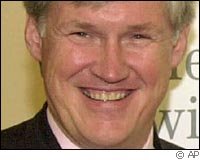 Submitted by Paul Ellis
Submitted by Paul EllisThe question is being asked by columnist Neil Peirce and the figure refers to the next wave of population growth virtually certain to occur by 2050. Peirce is foremost among American journalists on metropolitan regions, their political and economic dynamics, and their emerging national and global roles.
In a recent syndicated column, Peirce observes that 70 percent of the coming population and economic growth will take place in American “megaregions” sharing environmental systems and transportation networks that are far beyond the capacity of any individual metro region to manage. Good stewardship would dictate a new commitment to "smart” highways and high speed commuter rail that might speed workers, business travelers and goods between the megaregions’ networked cities, "stimulating idea exchange, expanding labor pools and providing fresh opportunities for workers," Peirce observes.
As the Puget Sound region plays catch-up with its transportation investments, we need to also look forward to the needs that will confront the next generation.
Paul Ellis is lead staff for RAMP; an employee of the Tacoma-Pierce County Chamber, Ellis led the Pierce County Transportation Advisory Committee (PCTAC), the communityÂ’s largest transportation planning effort.


 Submitted by Paul Ellis
Submitted by Paul Ellis





